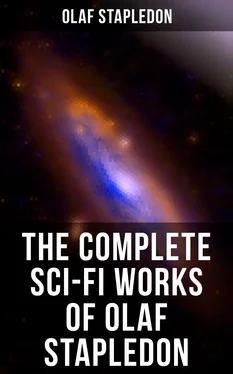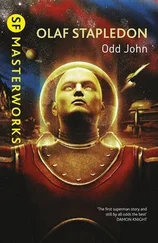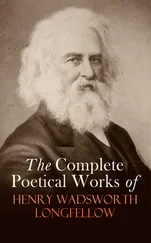Then he paused. Once more he bowed over the desk. Must he really help in their stupid war, their filthy, mad, backward-looking war, that was wrecking the civilization it was meant to save. It was like saving a man from death by an operation that was bound to be fatal. People said war was better than dishonour. But from the world point of view war was dishonour. Nothing was so base as war. Better far that the Germans should overrun Belgium, France, England. But no. The Archangel said this was all wrong. He said Jesus was definitely on our side. What was the truth about it all, what was the truth? ‘Jesus, Jesus, help me, if you ever help any one. Why am I alive? What is it all for? Why is there this terrible world? Why are we all so horrible?’ Jesus did not answer. Paul lay still, his mind almost blank; then he yawned, raised his head, and rested his chin on his hand. He had no further thoughts. He gazed vacantly at the chalk-grains on the desk.
At this point I undertook a serious intervention in Paul’s mind. As he gazed at the minute white points of the chalk, I induced him to regard them as stars in the Milky Way. I then made him blow upon the desk. The whole galaxy shifted, spread outwards, streamed down the sloping board; thousands of stars tumbled into the abyss. Paul watched, fascinated. Then he shuddered and covered his face with his hands. I now flooded his astonished mind with images and ideas. In imagination he still saw the star-dust streaming, whirling. But I made him seize, with miraculous vision, one out of all the myriad suns, round which circled infinitesimal planets. One of these planets his piercing eye regarded minutely. He watched its surface boiling, seething, settling into oceans and continents. Then with supernaturally penetrative eyes, he saw in the tidal waters of the ever-fluctuating, drifting continents the living Scum, our ancestor. He saw it propagate, spread, assume a thousand forms, invade the oceans and the lands. He saw forests creep over the plains; and with his magically piercing vision he detected among the greenery a sparse dust of beasts. Reptiles clambered, ran, took wing, or reached up to crunch the tree-tops. In a twinkling they vanished. Then beneath his eyes a finer and more vital dust, the mammals, was blown into every land. Now the tempo of his vision slowed, slowed. Man, super-simian, sprinkled the valleys with his hovels, the lake-shallows with his huts, the hill-tops with his megaliths. He set fire to the forests, tilled the plains, built cities, temples, palaces, Nilotic pyramids, Acropolis. Along thread-like imperial roads the legionaries percolated, like blood-corpuscles. Upon a minute hill, beside a city wall, a minute crowd existed and vanished. Presently there was a rash of churches, then little smoke-clouds of wars and revolutions, then a sudden tissue of steel tracks and murky blotches. And now to Paul’s straining eyes there appeared for an instant a little crooked line stretching across Europe. On either side of this line wave-trains drifted, infinitely faint, confused, but unmistakable. Wave-trains of grey, blue, khaki, were seen to advance upon the line from East and West, recoiling in feebler undulation athwart their own advancing successors. They vanished. The tempo of the vision accelerated. Æons rushed headlong into pastness. The minute continents deformed themselves. The little sun shrank, faded to a red spark; and as it did so the little planet became snowy white, a simple chalk-grain, which presently was lost in obscurity. The sun-spark was snuffed out. Paul’s gaze seized upon another sun. This also was snuffed out. One by one, thousand by thousand, all the stars were extinguished, till the whole galaxy had vanished. There was nothing left but darkness. It seemed to Paul that the dark flooded into his mind, wave upon wave. In vain he battled against it. The spirit of night had triumphed. His mind reeled, sickened, sank into unconsciousness. He lay still, with open eyes unseeing. But though he was now profoundly tranced, I, who had worked this change in him, still perceived through all his sense organs. I felt the slight indigestion that had been aggravating his despond. I felt the constriction of his collar, which was rather too small for him. Presently I felt a fly walk across his eyeball. He took no notice. But I, fearing that his trance might break too soon, caused his hand to drive away the intruder, and soothe the irritation. Once more he lay still.
When at length Paul emerged from this swoon, he found himself recalling with strange distinctness the tarn where long ago he had first watched the intersecting waves. In imagination he watched them now, progressing, interlacing, fading, reappearing in varying patterns on every quarter of the lake. On the actual occasion, they had roused in him little more than intellectual curiosity; but now they had acquired such grave significance that every briefest flurry, every ripple, seemed to imprint its form upon his own being. At first he resisted, though vainly. But soon the insistent rhythms calmed him to acquiescence. He let them mould him, re-form him, as they willed; and in this passivity he found peace. Presently he raised his head, sat up, looked round at the desks, the maps, the grey fields of the windows, his chalky hands, the clumsy writing of some ‘exercises’ awaiting correction. All was as before, yet all was now acceptable, strangely right, even beautiful. Under his breath he whispered ‘God! What a fool I was not to see it long ago!’
He looked at his watch, gathered up his things, and hurried away. In his step I felt a new buoyancy, in the stream of his thoughts a new and bracing freshness. Soon, no doubt, he would return to his former despair, but the memory of this experience would never wholly desert him.
At this point I left Paul, and returned to my own world. My first task was to work up the material which I had gathered from Paul and others, and to make it known to my colleagues. Next I took that holiday which was described at the outset of this book. I also participated in the awakening of the Racial Mind. Then at last I came back to Paul, re-discovering him, not precisely at the date where I had left him, but a few days later. The good that I had worked in him seemed already to have disappeared. I found him, as I have already reported, in an agony of indecision, tortured by little incidents in the streets of London.
It will be necessary to tell how Paul finally tackled his war problem. But for the present we must leave him. My concern with him is incidental to my main theme. He is but an instrument through which I chose to observe your world, and through which I choose to exhibit your world to you. He is also a sample of that world. I have shown the instrument in some detail, and I have displayed the sample; warning you that, though peculiarly significant, it is not an average sample. You have seen that Paul, when he came face to face with the war, was already at grips with certain problems which are in fact the supreme problems of your age. Let me close this chapter by enumerating them. There was the problem of ‘the flesh’ and ‘the spirit’, the problem of human personality and evolving Life, the problem of the divinity of love and the austerity of fate. It was with these problems already troubling consciousness, or stirring in regions deeper than consciousness, that all the more developed members of your species faced the war.
I now pass on to tell you how your war and your reactions to your war appear to the Last Men.
Конец ознакомительного фрагмента.
Текст предоставлен ООО «ЛитРес».
Прочитайте эту книгу целиком, купив полную легальную версию на ЛитРес.
Читать дальше












